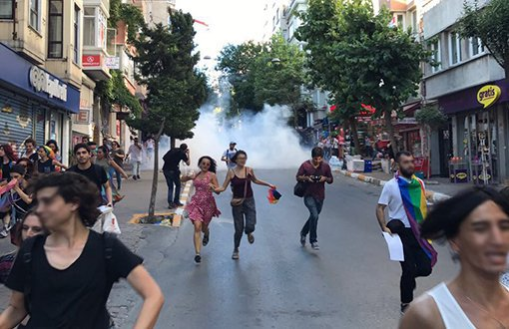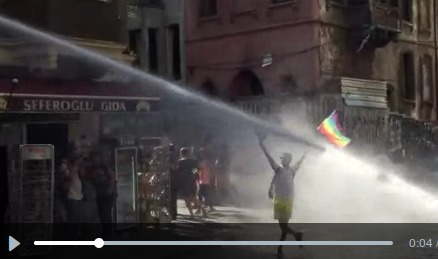As the saying goes, it all started with “a handful of people” and faced bans and obstacles, but as it reaches its 25th anniversary, Istanbul LGBTI+ Pride Week brings thousands together. This time we question “what’s between us?” In search of that “what” throughout the week, there will be many free of charge events such as panels, forums, workshops and plays.

Organized by volunteers and held with the solidarity of all participants, 25th Istanbul LGBTI+ Pride Week events will take place in various venues with the theme “What’s in that distance between us?” between June 19-25. The week will end with the Pride March on June 25.
Celebrated throughout the world during June with various events and marches, Pride has been celebrated in Izmir, Mersin, Antep and Kocaeli in Turkey. Istanbul Pride Week will begin with the joy of these events and marches held in these cities.
The Turkish Language Association defines “distance” as “the farness that separates two things.” But does distance only separate things, aren’t there any examples in which it brings things together? The loves that we hold on to so dearly, our hands, our touch and our longing for each other are lined up through that distance. The power that we get from sharing, standing in solitude, being together despite all seeming hopelessness and desperation stands there. Our courage to own the words used to hurt us, the greatest proof that we still stand, and our joy and laughter echoing in the most remote parts of the city are also there. There, all are our bodies; tall, short, fat, thin, in various shapes, various images, various tastes which we sometimes cannot define, sometimes transcends all the definitions there are yet which breathe, orgasm, walk, live, exist. We are that “distance,” we share that “distance.”
In that “distance” we have been subjected to the same oppressions as well. First, there is the government trying to take down our associations and, for the last two years, attacking our march. In the distance between us and the government, there is the sexist, patriarchal law which refrains from catching the murderers of Hande Kader and Ahmet Yıldız. In the distance between us and the city there is the power which incarcerates us into ghettos and which shapes the city, the gentrification which takes our homes and neighborhoods away from us; and in the distance between us and the streets there are paramilitary groups who summon an attack on our marches and are supported openly by the government and the unfair law.
On top of that, there is a giant polarization which leads the people to intolerance, ostracizing the one who is not like the majority. This culture is now so deeply rooted, so strong, so well-established that it sneaks its way even into our circles of solidarity, affects our combat spaces. What is in that distance between us that divides, separates, angers us so much?
In such an age where solidarity is essential more than ever before, we think we should discuss the things that divide us and bring us together. In spite of all the oppression that we faced, there are gorgeous things in that distance which helps us exist in this city, this country, this society. To resist the despair that we live in and the inertia that we drift into, we suggest to hold onto each other.
Happy 25th Istanbul LGBTI+ Pride Week!
WHAT’S HAPPENING IN THE 25TH PRIDE WEEK:
Our solidarity causes everything in society to enter into the interests of LGBTI+s and so into the Pride Week’s. Therefore in the week often described as “colorful”, there are two panels regarding the State of Emergency, an issue that is not that colorful. And in the three-day workshop on video activism will enable us to talk and learn about different ways of resistance and solidarity.
Participants coming from different LGBTI+ organizations in 18 cities Turkey-wide will share the local dynamics of the LGBTI+ movement on the aspects of organizing and practices of combat.
The LGBTI+ movement questions not only the discrimination between people but the relationship of the humankind with other species. In light of this issue, there will be a discussion on vegan politics based on eco-feminism/animal rights and a vegan picnic to create a space for vegan politics to be discussed.
Besides all these, there will be workshops, forums, Pride Week Exhibition based on passion, bodies, LGBTI+ culture and LGBTI+ spirituality and also panels and workshops on topics less discussed such as colonialism, being in jail and asexuality.
In most evenings throughout the program there will be plays. Poetry events and mural painting also take place during the program.
PRIDE WEEK PROGRAM:
http://tr.prideistanbul.org/anasayfa
www.facebook.com/istanbulpride
PHOTOS: https://drive.google.com/folderview?id=0ByhK9vIqeMica0NSZndhc0J2V2s (We kindly request the publisher to indicate the photographers’ names.)
INTERVIEWS AND PRESS INQUIRIES: Lara Güney Özlen 0536 437 41 61
NOTE TO THE EDITOR:
LGBTI+ stands for: Lesbian, Gay, Bisexual, Trans, Intersex, Plus. Last year, Istanbul LGBTI+ Pride Week added the “+” to the end. Istanbul LGBTI+ Pride Week Committee explains adding the “+” after the initial for Intersex in the past years due to the fact that “we say all the combinations in the rainbow exist in our movement and we aim to socialize people with the idea of not attributing a fixed identity to anyone by judging from the outside”.
About Pride Week: On June 28, 1969, gay and trans people rose against the oppression and violence that targeted them in the Stonewall Inn Bar in New York; trapped, the police came to bust the place and the protests and the conflicts spread to the streets for four days. This day, a turning point for the LGBTI+ movement, is celebrated all around the world in Pride Week. In Turkey it was first attempted to celebrate this day in 1993 as “Sexual Freedom Week”. But with a governorate ban, arrests and deportation of the foreign guests, the Pride March couldn’t happen. In the face of bans, the demands of and the support for the movement grew stronger and the first Pride March took place in 2003, ten years after the Pride Week had begun to be organized. The march, which was participated in by only 20-30 people back then, grew incrementally. It is estimated that around 100,000 people joined the march in 2013. In 2015, the 13th Pride March was surprisingly disrupted by the police force. In the year 2016 there was similar police interference, and the interference was met both with the resistance on the streets and the reading of the press statement repeatedly all around the city. We are determined to continue the resistance because the streets are ours. The LGBTI+ movement with hope and tenacity, calls everyone to fill the streets on the June 25, 2017 for the 15th Pride March.
Share this:
-
Click to print (Opens in new window)
-
Click to email this to a friend (Opens in new window)
-
Click to share on Facebook (Opens in new window)
-
Click to share on Pinterest (Opens in new window)
-
Click to share on Tumblr (Opens in new window)
-
Click to share on Reddit (Opens in new window)
-
Click to share on Pocket (Opens in new window)
-
Like this:
Like Loading...

 Foto: Şener Yılmaz Aslan / MOKU
Foto: Şener Yılmaz Aslan / MOKU

![[Left-hand leaflet] People who are not from the AK Party [AKP- Justice and Development Party] and who are not conservative think there is an intervention to their life styles. Do you think you intervene in the life styles of people different than you? [Right-hand leaflet] AK Party has been in power for 13 years. It has solved the problems of the conservative segment, which brought it [the party] to power, only in the last 4 years after it even had to pull through the dangers of party closure. Turkey is a country that can hold a Gay Pride on Istiklal Avenue in the middle of the month of Ramadan. The increased visibility of conservative people does not carry the meaning that there is an intervention to people's life styles. Yes, now there is visibility of more people in head scarves and people who can practice their religion more comfortably because they were under pressure before. AK Party has never had and will never have the intention to intervene in anybody's life style. In the period of 13 years, there has only been a fight for the equality of wronged segments.](https://lgbtinewsturkey.files.wordpress.com/2015/07/akp_brochure.jpg?w=620)


